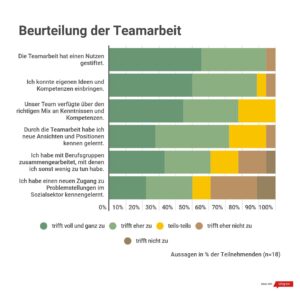Digital solutions for social work
In December 2020, Bern University of Applied Sciences hosted Hack4SocialGood, bringing together the social sector and tech sector. The event marks a promising start for inclusive digitalisation. The Corona crisis is largely paralysing public life, which is also dramatically accelerating the trend towards digitalisation. Work and social life is moving to the internet and relying more and more on digital solutions. Hardly any area of life can escape the advancing digitalisation. This has not only been the case since Corona. Social work is also increasingly dealing with the effects of digitalisation and asking itself how this development could be better, i.e. above all more inclusive.
This question was addressed by around 75 people who met last December for Hack4SocialGood. In keeping with the times and the theme, the event took place completely digitally. With the support of a wide range of sponsors, it was possible to organise a varied programme. In addition to inspiring presentations, the Prix sozialinfo.ch was awarded and Renato Kaiser surprised the participants with an evening greeting.
Work on real-life challenges in practice
The main part of the event was a hackathon, in which interdisciplinary teams took on a variety of challenges set and prepared by partners from the field. The challenge “Cubo – Take your life in your hands“, for example, challenged participants to think of possible uses for the playfully designed cube “Cubo”, which is intended to facilitate access to the digital world for people who are less tech-savvy. In the challenge “Poverty and Inequality“, the participants had to think about how the ever more extensive data on the financial situation of the population could be used to support those affected by poverty. An overview of the solutions developed can be found on the event page
Challenges at Hack4SocialGood:

Within 24 hours, the challenge was to design the most sophisticated solution possible that combines the concerns of social work and technical skills. Conceptual skills as well as technical skills were in demand. In order to solve the problem in a goal-oriented way, it is crucial that the people involved find a common language despite their different backgrounds, which is not always easy.
Participants with different backgrounds join hands
Who is prepared to take such a risk? An evaluation carried out for the occasion(0309_Hack4SocialGood EVAL ) provides information. For example, it was possible to recruit people with different professional backgrounds for the challenges: Specialists in the technology sector (42% of registrations) and professionals from the social sector (38%) registered almost equally often. People from research and development (20%) were also interested in the event. There was a gratifyingly high proportion of women among the participants (37%) and the age range was from 27 to 56 years. Three quarters of the participants were taking part in a hackathon for the first time. Motives such as social engagement, networking, curiosity but also fun were in the foreground. Overall, most of the participants were optimistic about the ongoing digitalisation in the social sector.
The group was also characterised by a high willingness to experiment and a tolerance of situations with uncertain outcomes, which seems to be crucial for successful cooperation. Thus, a majority experienced the teamwork as satisfying and stated that they were able to contribute their ideas and competences despite the different backgrounds. The collaboration between ethnologist Annina Indermühle and computer scientist Johannes Hool, who together developed a tool to support social workers in accompanying asylum seekers and refugees, was exemplary and won the jury prize.
Assessment of the teamwork

Mean values, response scale 1 = strongly disagree to 5 = strongly agree, n = 28
Further steps towards inclusive digitalisation
Is that the end of it? Of course not. Inclusive digitalisation is only at the beginning. There is still a long way to go before all population groups can participate in and benefit from the digital transformation. The Hack4Social provided a platform for this concern. Almost without exception, the participants recommended a continuation of the Hack4SocialGoods. We are happy to take the momentum with us and look forward to the next round.
Contact:
Projects
Articles and reports
- Endrissat, Nada (2021): 0309_Hack4SocialGood EVAL- Hack4Social Good-Innovation workshop for inclusive digitalisation. Evaluation of the online hackathon from 11-13 December 2020
- Endrissat, Nada and Hümbelin, Oliver (2019): Brave new world of work: innovation and inclusion through hackathons; In: Presence 2/2019, p. 26
- Hümbelin, Oliver, Debra, Hevenstone, Nada Endrissat and Caroline Pulver(2020): Digitalisation can be shaped; In: impuls 1/2020, pp. 26-29.
- Müller, Sarah (2020): Hackathon for inclusive digitalisation in the social sector; In: knoten & maschen
 Create PDF
Create PDF

 Contributions as RSS
Contributions as RSS
Leave a Reply
Want to join the discussion?Feel free to contribute!